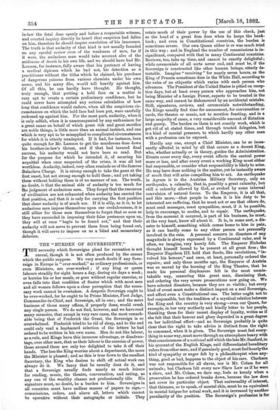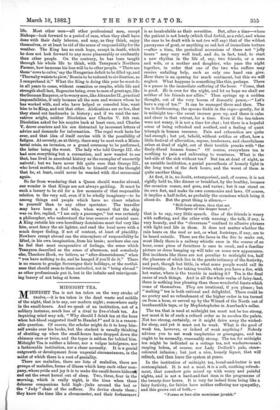THE "BURDEN OF SOVEREIGNTY."
THE necessity which Sovereigns plead for recreation is not unreal, though it is not often produced by the causes which the public suppose. We very much doubt if any Sove- reign in Europe is " over-worked," as ordinary professionals, or even Ministers, are over-worked ; if any king or queen labours steadily for eight hours a day, during six days a week; or hurries his or her meals, or goes without regular exercise, or even falls into that condition of fluster which with most men and all women follows upon a clear perception that the neces- sary work cannot be overtaken. A despotic Sovereign ought to be over-worked, for he ought to be Prime Minister, First Judge, Commander-in-Chief, and Sovereign, all in one ; and the mere business of those many offices, if properly done, would crush any single person. We do not find, however, and we have read many memoirs, that except in very rare cases, the most remark- able being that of Frederick the Great, the Sovereign is so overwhelmed. Frederick tried to be rid of sleep, and to the end could only read a haphazard. selection of the letters" he had ordered to be written in his own name. Men do not like labour, as a rule, and Kings have this immense advantage, or disadvan- tage, over other men, that as their labour is the exercise of power, those around them are only too delighted to take it off their hands. The less the King worries about a department, the more the Minister is pleased; and as this is true down to the smallest Secretary, the King who desires to shift off actual work can always do it. We fancy that he usually does do it, and that a Sovereign usually finds nearly as much leisure for reading, music, the theatre, conversation, and eating, as any one of the wealthy classes not professionally idle. His signature must, no doubt, be a burden to him. Sovereigns in all countries must have endless masses of papers to sign,— commissions, orders, and above all, letters which cannot be operative without their autographs or initials. They retain much of their power by the use of this check, just as the head of a great firm does when he keeps the bank- book; and even in Constitutional countries, the burden is sometimes severe. Our own Queen either is or was much tried in this way; and in England the number of commissions is in- significant, compared with that in many Continental countries. Reviews, too, take up time, and cannot be exactly delightful; while ceremonials of all sorts never end, and must be, if the Sovereign is constructed like other human beings, utterly de- testable. Imagine " receiving " for nearly seven hours, as the King of Prussia sometimes does in the White Hall, according to the rules of an etiquette which varies with each person who advances. The President of the United States is pitied on recep- tion days, but at least every person who approaches him, not being Minister of a foreign Power, expects to be treated in the same way, and cannot be dishonoured by an accidental mistake. Still, signatures, reviews, and ceremonials notwithstanding, the Kings usually find time for amusement, for conversation or cards, the theatre or music, not to mention feasting, and in a large majority of cases, a very considerable amount of flirtation and gossip. The burden on them is not exactly work, which is got rid of at stated times, and through trusted delegates, but is a kind of mental pressure, to which hardly any other man with a profession can be exposed.
Hardly any one, except a Chief Minister, can be so inces- santly affected in mind by all that occurs as a decent King, who, whether actually or in theory, guides the Administration. Events occur every day, every event affects the central power more or less, and after every event a working King must either feel responsible, or consider what responsibility is likely to arise. He may have done nothing in the matter, yet be instantly aware of much that will arise compelling him to act. An earthquake in Agram is to the Austrian Military Secretary, only an earthquake, a calamity, that is, possibly a great calamity, but still a calamity allowed by God, or evoked by some internal convulsion of natural forces. To the Emperor, it is all that, and this more,—that people in whom it is his duty to be interested are suffering, that he must act or see that others do, must send messages, must sympathise, must, if it be possible, help to encourage, to soothe, and to repair. The earthquake, from the moment it occurred, is part of his business, he must, at the very least, know all about it. It is, in some sort, a dis- aster to himself, something which comes home to him in pain, as it can hardly come to any other person not personally involved in the ruin. A personal concern in disasters of any magnitude is always expressed by a Continental ruler, and is often, we imagine, very keenly felt. The Emperor Nicholas thought himself bound to be present at all great fires ; the Emperor Napoleon III. held that floods, like revolutions, "in- volved his honour," and once, at least, personally ordered the repairs; and only three months ago, the Emperor of Austria was so moved by the burning of the Ring Theatre, that he made his personal displeasure felt in the most unmis- takable way, censuring this great man, dismissing that, and ordering the very severe prosecutions now going on. We have selected disasters, because they are so visible; but every kind of event must make a distinct impact on a real Sovereign, and affect even a Constitutional one. The latter ought not to feel responsible, but the tradition of a mystical relation between the King and the country is very strong—even our Queen, for example, in her very motherly and kindly letter to her people, thanking them for their recent display of loyalty, writes as if she felt that their honour and glory depended in a great degree on her individual effort—and no Sovereign probably is quite clear that the right to take advice is distinct from the right to command, when it is given. The Sovereign must feel every- thing in some way, must move through an atmosphere heavy with that consciousness of a national self which the late Mr. Sanfordiin his account of the English Kings, said differentiated hereditary rulers from other men; and if genuinely good, must feel hourlythe kind of sympathy or anger felt by a philanthropist when any- thing, good or bad, happens to the object of his care. Clarkson was not responsible for all slaves, nor is Mr. Colam for all animals; but Clarkson felt every new Slave Law as if he were a slave, and Mr. Colam, we dare say, feels as keenly when a prosecution he has ordered breaks down, because the law does not cover its particular object. That universality of interest, that thinness, so to speak, of mental skin, must be an equivalent in mental fatigue for actual work, and it is increased by another peculiarity of the position. The Sovereign's profession is for
life. Most other men—all other professional men, except Bishops—look forward to a period of ease, when they shall have done with their daily labours, and may, as they think, enjoy themselves, or at least be rid of the sense of responsibility for the weather. The King has no such hope, except in death, which he does not look forward to any more pleasurably or exultantly than other people. On the contrary, he has been taught through his whole life to think, with Tennyson's Northern Farmer, how immense his loss will be to other people. " There are those cows to calve,' say the Hungarian deficit to be filled up, and Thornaby waste to plow,' Bosnia to be reduced to civilisation, as I comprehend it." What the King is doing this year be must do in all years to come, without cessation or respite, while life and strength shall last, Regencies being, even to men of great age, like the German Emperor, or to weary men, like Alexander II., practical impossibilities, if only because all the men and women whom he has worked with, and who have helped or consoled him, want him to be King, and not that other. Abdications are so few, that they stand out landmarks in history; and if we read the nar- ratives aright, neither Diocletian nor Charles V. felt rest. Diocletian asked for his sceptre back at least once, and Charles V. drove couriers and his son distracted by incessant letters of advice and demands for information. The regal work lasts for ever, and that idea of itself carries with it the possibility of fatigue. At seventy, as at thirty, there may be next week a Minis- terial crisis, an invasion, or a grand ceremony to be performed, the latter being the worst. The lady who told George III. she had seen everything but a, coronation, and now wanted to see that, has lived in anecdotal history as the exemplar of uncourtly naivete ; but we have never felt quite sure that George who loved mutton, did not chuckle to himself over the thought that he, at least, could never be wearied with that ceremonial Wk.
So fax from wondering that a Queen should wander abroad, our wonder is that Kings are not always gadding. It must be such a luxury to be rid for a few moments of that responsible relation to the very soil, even if it be wholly imaginary—to be among things and people which have no closer relation to yourself than to any other spectator. The traveller may have been a fool who, when warned that the ship was on fire, replied, " I am only a passenger," but was certainly a philosopher, who understood the true sources of mental ease. A King outside his own hereditary dominions must feel very like him, must fancy the air lighter, and read the local news with a much deeper feeling, if not of content, at least of placidity. Nowhere except abroad can the atmosphere of responsibility be lifted, in his own imagination, from his brain; nowhere else can he feel that most recuperative of feelings, the sense which Tennyson described as the sense of afternoon, and somebody else, Theodore Hook, we believe, as " after-dinnerishness," when "'you have nothing to do, and be hanged if you'll do it." There is no reason to grudge Sovereigns their holidays, or the restful- ness that should seem to them embodied, not in " being abroad " as other professionals put it, but in the infinite and reinvigorat- ing luxury of not being at home.



































 Previous page
Previous page